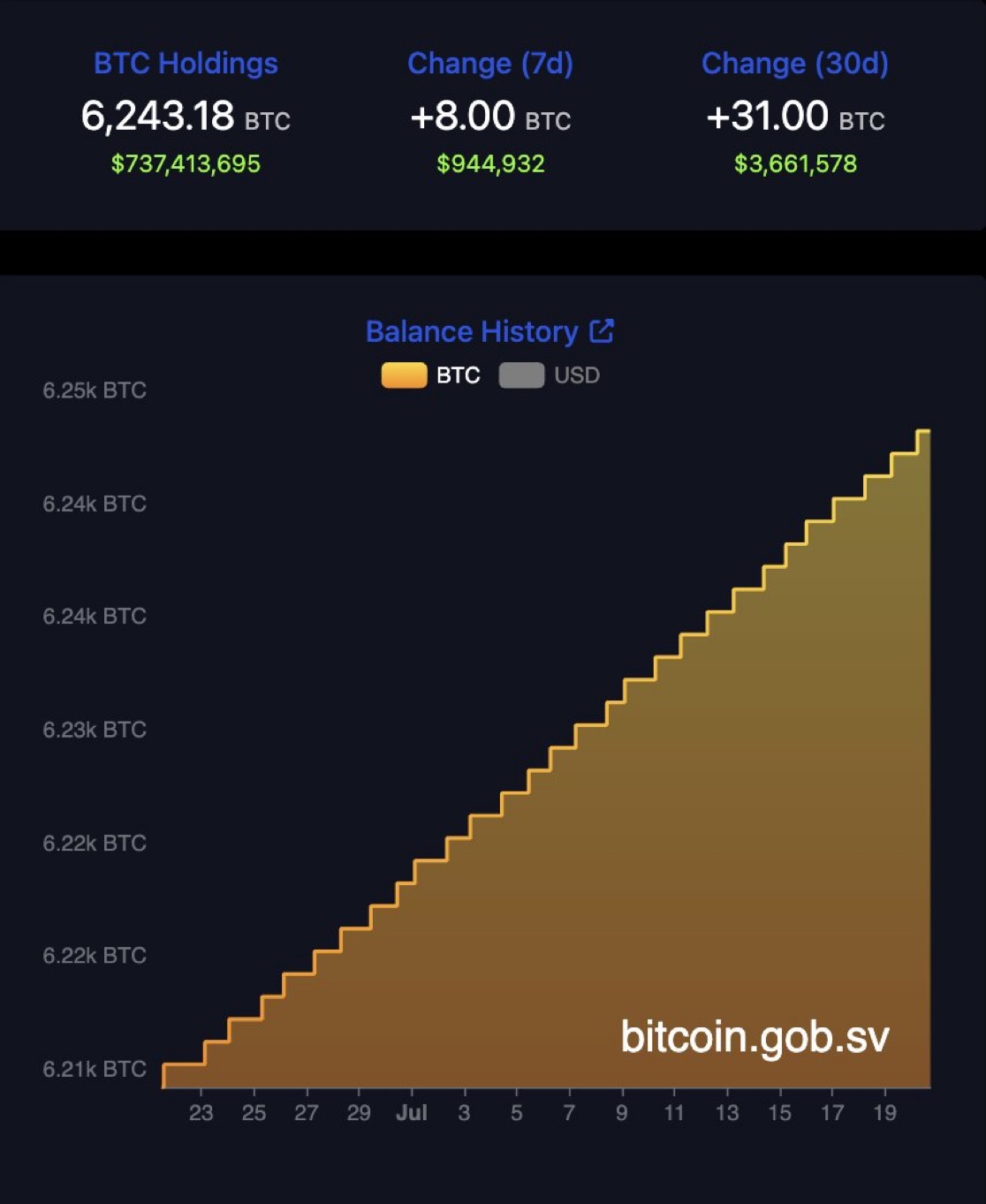IMF Exposes El Salvador’s Bitcoin Freeze: "1 BTC Per Day" Strategy Dead Since February
El Salvador's bold crypto experiment hits a wall—IMF reports the government hasn't bought Bitcoin since February. So much for that "1 BTC per day" promise.
The Central American nation made headlines in 2021 by becoming the first country to adopt Bitcoin as legal tender. Now it appears even true believers get cold feet when the bear market bites.
President Nayib Bukele's famous accumulation strategy—which saw the country stack over 2,300 BTC—has gone radio silent. No official explanation, just another case of politicians treating public funds like a degenerate's leveraged trading account.
Meanwhile, Salvadorans still can't use Bitcoin to pay taxes—the ultimate irony for a "legal tender." Maybe they should've listened to the IMF's warnings about volatility... or at least set up stop-losses.
IMF Lauds El Salvador’s Bitcoin Reforms, Confirms Policy Shift
A letter signed by Central Bank President Douglas Pablo Rodríguez Fuentes and Finance Minister Jerson Rogelio Posada Molina confirmed that “the stock of Bitcoins held by the public sector remains unchanged.”
The IMF report also revealed that El Salvador is moving to scale back its public involvement in Bitcoin-related services. One of the key changes includes reducing the role of the Chivo wallet, the state-backed digital asset platform, and ultimately ending its operation by July 2025.
The Chivo wallet, once promoted as a centerpiece of the country’s Bitcoin adoption, will be shut down from public control, and the IMF clarified that while the wallet will remain operational, it must be fully privatized and no longer run on government funds.
The report noted that although on-chain activity shows BTC moving between wallets, these are not new acquisitions. Instead, the transactions reflect internal transfers between cold and hot wallets.
The IMF emphasized that these movements had led to a “misinterpretation” of El Salvador’s Bitcoin activity. Officials further argue that reallocated reserves or assets obtained through legal seizures do not qualify as state-backed Bitcoin buys.
According to the El Salvador Bitcoin Office, El Salvador currently holds about 6,244 BTC, worth roughly $742 million.

While some reports suggested an 8 BTC increase last week, the IMF attributes this to technical accounting, not fresh buys.
![]() El Salvador has approved amendments to its Bitcoin laws, aligning with a deal struck with the IMF to scale back its crypto exposure. #ElSalvador #Bitcoinhttps://t.co/2BDlo3RCGg
El Salvador has approved amendments to its Bitcoin laws, aligning with a deal struck with the IMF to scale back its crypto exposure. #ElSalvador #Bitcoinhttps://t.co/2BDlo3RCGg
The IMF praised the updated Bitcoin policy for reducing fiscal risk and strengthening transparency. It said these steps were helping to stabilize inflation and restore macroeconomic stability in the country.
Official vs. On-Chain: The Bitcoin Mystery Behind El Salvador’s Treasury
Despite growing public interest in sovereign Bitcoin reserves, the IMF is pushing El Salvador to treat BTC as a financial asset with risk exposure, not as a currency.
As part of the agreement, Bitcoin is no longer considered mandatory legal tender.
While the Salvadoran government insists it is still “stacking sats,” the IMF’s statement indicates otherwise. The divergence in interpretation has added fuel to a broader debate around sovereign BTC holdings.
![]() President Nayib Bukele recently clarified that El Salvador won’t stop its BTC accumulating strategy.#ElSalvador #BitcoinReserve #NayibBukelehttps://t.co/EJ4m8VOxYs
President Nayib Bukele recently clarified that El Salvador won’t stop its BTC accumulating strategy.#ElSalvador #BitcoinReserve #NayibBukelehttps://t.co/EJ4m8VOxYs
Some blockchain analysts, including firms like Arkham, have observed steady 1 BTC per day transfers from exchanges like Binance and Bitfinex to addresses reportedly linked to the Salvadoran government. Still, whether these are official purchases or private transactions remains unclear.
Other governments and companies continue to expand their Bitcoin treasuries. Japan’s Metaplanet recently acquired 797 Bitcoin for $93.6 million. On Tuesday, the firm announced plans to purchase a digital bank to expand its crypto services.
Meanwhile, The Blockchain Group in France and the UK’s Smarter Web Company added over 340 BTC combined. Strategy, the first Bitcoin treasury company, posted $14 billion in unrealized gains in Q2 2025.
Compared to this international trend, El Salvador’s quiet pause signals a shift. The IMF is scheduled to conduct further reviews in September and December 2025 to track compliance.
For now, El Salvador’s public BTC balance appears to be holding steady, with no new government-funded purchases. The IMF says the country is sticking to its agreement. The Bukele administration says otherwise.
With Bitcoin’s price nearing record highs, the divide between official reporting and on-chain speculation is likely to grow. The next few months may prove decisive in shaping the future of sovereign crypto strategy.

